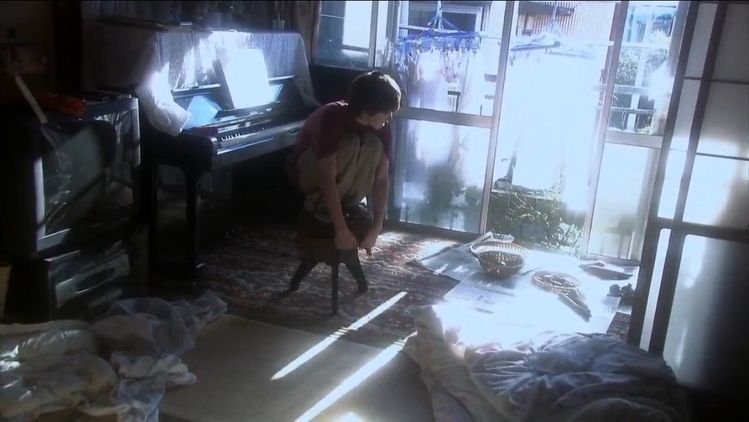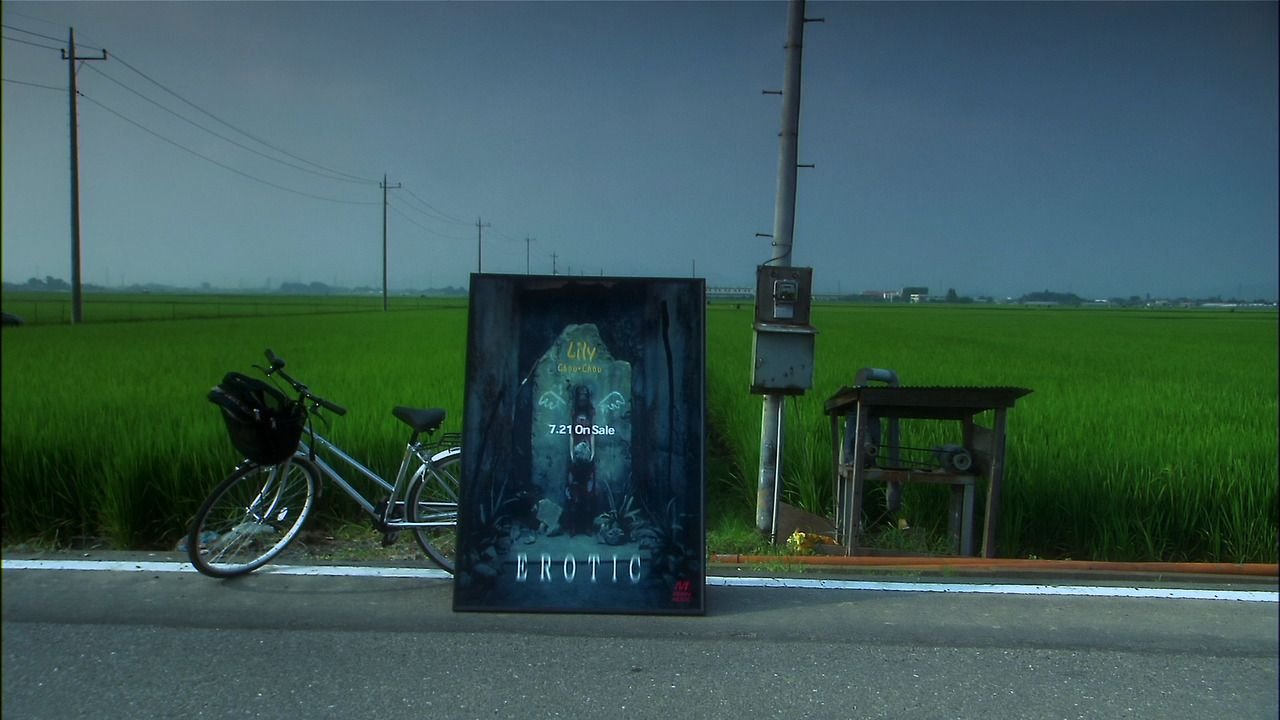A Masterpiece Forever: The Soundtrack of “All About Lily Chou-Chou”

The soundtrack to any movie is an imperative part of its message, composition, and the emotional effect it has on its viewers.
Oftentimes, a film’s soundtrack and score powerfully emphasize the story, its characters’ emotional rhythms, and enhances visual imagery we experience. No other film elevates a movie soundtrack to the level that Shunji Iwai’s 2001 cinematic masterpiece, All About Lily Chou-Chou does. Not only did the director help produce the soundtrack and its lyrics, he also created lore surrounding the project a year ahead of the film’s general release in 2001, crafting a detailed online chat room supposedly written by “fans” chronicling the fictional universe of “All About Lily Chou Chou”.
The soundtrack of “All About Lily Chou-Chou” is an aspect of the film that simply cannot be separated from its overarching narrative. Lily’s history, both in the film itself and in the real world, plays an imperative role in not only the music she performs but the character development that Yuichi, Hoshino, and many others go through in proximity to Lily and her music. Iwai’s dedication to building the musical “persona” of Lily Chou-Chou that lives inside his movie’s universe took the concept of a soundtrack and transformed it into an organic, life-like character in itself. All About Lily Chou-Chou’s soundtrack manages to not only contribute to the story of the film and the conflicts of its cast, but stands on its own as a marvel in thematic musicality. Here is a deep dive analysis of the legend surrounding Lily Chou-Chou’s creation as a fictional alt-pop star, the symbolism behind the soundtrack’s lyrics, and why All About Lily Chou-Chou’s soundtrack continues to generate tens of thousands of listeners monthly over a decade after its release.
The narrative of the film is rather simple: we follow the story of two young boys, Yuichi Hasumi and Shusuke Hoshino, as their relationship begins, develops, and collapses over the course of several years as they progress through middle school. What connects both Yuichi and Hoshino, although unspoken to one another, is their complete dedication and admiration for Lily Chou-Chou. Yuichi himself serves as an admin for the fan website titled “Lilyphilia,” under the name “Philia,” while Hoshino’s role in the online-based BBS plot unravels as the film progresses. Both of these boys, as well as the additional characters that surround them, are in one way or another critically impacted by Lily’s music, as well as the prevalence of the “Ether” that cocoons and encapsulates their entire being. Each character, however, has their own unique perspective on Lily and the power her music has, and their interpretations of her sounds and lyrics lead them to blissful as well as disastrous ends. The events of this story culminate into a climax that is less satisfying than it is heartbreaking, only to slowly dissipate and end in a hopeful moment of piano-backed bliss in a sun-filled classroom.
THE ILLUSION OF REALITY
In June of 2000, on the Japanese music variety show Hey! Hey! Hey! Music Champ, a new face in the industry by the name of Lily Chou-Chou performed one of her debut singles, “共鳴 (空虚な石)” [Resonance -Hollow Stone] for the first time.
The song, just over two minutes in length, is an emotional and passionate ballad with lyrics detailing a vague but raw look into the pained heart of its singer, evoking imagery of a hollow stone forming within her heart as she contemplates her place in the universe in the face of a broken romance. Of course, this is only a single interpretation of the lyrics, but the song is nonetheless powerful to the listener, and it'd be clear to any viewer of the programs that Lily is a promising young artist to keep an eye on at the start of the new millennium.
New and eager fans began to search the internet for a space to relay their thoughts, feelings, and reactions to Lily’s music, only to come across a fan website already created, by the name of Lilyphilia. The website features a Bulletin Board System [BBS], in which fans can freely post whatever they want for others to see, with only a single rule being designated by the site’s admin, Philia, in order to participate: that you have to “love Lily.” However, as fans begin to flock to Lilyphilia and make posts themselves, there seems to be a conversation between two users, Philia and Blue Cat, that spans for months prior to Lily’s TV debut. Philia and Blue Cat have sporadic but extensive exchanges regarding their strong feelings for Lily, their intimate connection to the “Ether,” and how the troubles of their everyday lives are piling up at a rapid rate. It is clear to the site’s newcomers that these two users were going through a truly devastating part of their lives behind the screen, although the details of which are left ambiguous and cryptic. At some point, around the end of 1999, the messages from Blue Cat and Filia abruptly stopped, and a new admin named “Pascal” took over the website, reviving it as Lilyholic for all present and future users.
Lily’s TV debut on “Hey! Hey! Hey! Music Champ” , June 19, 2000
At this time, under the site’s “Media” page, two newspaper articles from the Teito Shimbun were posted that detail a horrific accident that took place following a Lily Chou-Chou concert on December 8th, 1999. The first article relays that a crowd of Lily fans outside the Shibuya-based venue collapsed, during which 10 people were injured and one, a 15 year-old by the name of Shusuke Hoshino, was seemingly crushed to death under the other fans. The second expands on this incident, detailing that an autopsy report on Hoshino revealed that he actually died from a stab wound, and the suspected murderer had not yet been identified. The article also references the history of death associated with Lily’s name, as another fan of hers commited suicide earlier that year.
Following Filia and Blue Cat’s disappearance from the BBS, Pascal posts a front page note to all users of the Lilyholic website detailing his new position as admin and that he intends to “revive” the fan site in line with its former glory. Pascal also makes a stark announcement that will forever change the reality of the site’s users: that his real name is Shunji Iwai, and he is making a film about Lily and the events that led up to the deadly incident outside her concert hall in 1999, which is to be titled “All About Lily Chou-Chou.”
THE MIND BEHIND THE FILM
This reality-bending prologue to “All About Lily Chou-Chou” only manages to be the tip of the iceberg in regards to the film’s multi-textual nature. In reality, the Lilyphilia/Lilyholic sites that fans managed to find on the early-internet sphere following Lily’s musical “debut” were almost entirely manufactured by Shunji Iwai himself. Iwai created the sites as well as the characters of Philia, Blue Cat, and Pascal all on his own in order to create an “online novel” that would serve as the basis for his upcoming cinematic venture. The film itself serves as an extension of the BBS conversations featured on the website as well as the artificial newspaper postings.
Movie poster for All About Lily Chou Chou
The users, such as Philia and Blue Cat, are actually matched with characters in Iwai’s film, and their interweaving plots conjoin around the identity of Lily Chou-Chou, who is revealed to be an entirely fictionalized musician. However, this is where the threads of Iwai’s master plot begin to settle into place, as while Lily herself is simply a name associated with a collection of songs used as the soundtrack to Iwai’s project, her presence and music are used in a way that no other film has managed to quite achieve. In essence, the ways in which Lily Chou-Chou is presented and received, both in the real world and the universe of the film, manages to transform the soundtrack - a tool usually used to fill in the space of a film’s events or enhance emotional beats - into a character entirely of its own making, and dons the viewer with a sense of participation in a story that is out of their control, making the lasting effects of the film all the more intense, heart-crushing, and contemplative.
WHO IS LILY?
Truthfully, Lily Chou-Chou is a musical project created by Iwai, producer Takeshi Kobayashi, and singer Ayako Mori, who would go on to have a successful career under the stage name Salyu a few years after the film debuted. Lily would not only be used as a pivotal character in the plot of the film, in line with its title, but the songs created under her name would be used as the film’s soundtrack, blurring the lines between Lily’s reality and unreality. On its surface, the film itself is a simple albeit gruesome look into the lives of several young children living in the Japanese countryside in the latter years of Japan’s “Lost Decade.” As the 1980s, one of the country’s most prosperous and luxurious eras in its contemporary history, came to a close, the 1990s became a time of economic and emotional decadence after the recession of 1991.
Lily Chou Chou 20th year reunion
With news-spanning headlines detailing a massive increase in youth violence and suicide during this decade, young people living in the country saw themselves on a road to nowhere, standing at a crossroads of misdirection and loneliness, not far from what Yuichi describes as the “age of grey” within the film. To make things worse, complicit or even abusive adults catalyze the unhealthy behaviors of the children we see, representative of the lack of societal assistance or guidance during this complex and isolating time in Japan. However, when these systems fail and young people stand at a crossroads of confusion and apathy, All About Lily Chou-Chou’s answer to help guide those in need is quite simple: music.
Within the film, the titular musician, Lily Chou-Chou, is seen by her fans as a god among mortals, a mystical and magical provider of calm, belonging, and purpose at a time when such feelings are seemingly out of reach in the real world. Through her music, Lily is able to access and share the “Ether,” an omni-present yet invisible force that surrounds and comforts those who choose to listen and dedicate themselves to her music, with Yuichi and our cast of characters themselves acting as dedicated followers of Lily’s word and sound. The film, however, takes this form of idolatry to its extremes, as characters interpret Lily’s lyrics in ways that are both completely comforting as well as downright tyrannical. This film displays the spectrum and extremes of fandom, and how the words of an artist that so many people love and adore can be twisted and morphed to inspire violence and betrayal. This concept is even touched upon in the movie itself, with several characters referencing the hidden duty of all supposed Lily fans: “don’t spoil the Ether.”
THE LORE OF LILY
Symbol of Lily Chou Chou
Outside of Lily’s real-life “artificiality,” she has an in-universe backstory that plays an important role in both the sound of her music as well as how fans become connected to her through her lore, affirming or twisting the idealist images they have of the musician. Within the film, Lily used to be the lead vocalist for another band, “Philia,” which broke up in 1997 just a couple years after their debut. Another member, Katuro Kayama, went on to lead a major-label band under the name “Yellow Fellows,” for which Lily wrote lyrics. Following the start of Lily’s solo career, rumors and gossip spread throughout her fanbase that tainted her image, as non-fans accused her of ghostwriting those songs as well as having been boosted by Katsuro’s newfound success. At the scene of the concert in the last leg of the film, a fan waiting in line reaffirms this rumor, and as a result several fans around him begin to beat him up in defense of Lily and the “Ether” - a realistic representation of a devoted fan base lashing out at those who stain their idol’s name.
The existence of an in-universe backstory on top of Lily’s real-world origins adds to the illusion of her existence, and yet emphasizes our own participation in the events we witness on screen. When it comes to any musician or idol, fans desire to know about their history, story, and personality through their own experiences in order for that idol to become more relatable and “down to earth.” While this may not always be the case, dedicated fans will look into the lives of their idols as a way of humanizing their status and create a connection that lets them become closer to the art being created, as well as the idol themselves. In a modern context, we know this all too well as parasocial relationships, wherein fans dedicate their time and interest to Lily and her music, while Lily herself is simply a person who happens to create art that appeals to a great number of people without knowing them personally. Within this exchange, Lily’s humanity becomes reduced as fans begin to form and distort their own perceptions based on her music, history, and controversy. Even in 2001, Lily Chou-Chou stands as a golden example of a contemporary concept in the age of online interaction and connection that forces idols, musicians or otherwise, to have their own sense of reality or authenticity stripped by their own fame and public perception. In this sense, the question of Lily’s “authenticity” as either a real-world artist or artificial idol begins to lose its footing, as fans themselves are able to validate or dismantle her humanity on their own; Lily, like many in the music industry, stands as a figure entirely formed from the hands and minds of her fans.
Opening - “アラベスク” [Arabesuku]
As the opening seconds of “All About Lily Chou-Chou'' roll in, the viewer is met with a melancholic melody of organ-like synths that slowly churn out as a cryptic text is overlaid upon a black background. The opening line of the film, rather than dialogue, is a post on the Lilyphilia website by the user Philia, who gives us our first information about Lily: that she was born at 10:50PM on December 8th, 1980, the exact moment John Lennon was murdered outside his New York residence. As we learn this oddly specific information about the mysterious figure, a steady, rhythmic drum pattern accompanies the lingering synthesizer. As layers of digital instrumentation begin to build, the screen cuts to show a vast, luscious field of green with a young boy standing at its center holding a Discman with his headphones on. His clean white shirt in stark contrast to his surroundings draws our attention as BBS messages continue to roll over the landscape. Philia, who is in fact the boy in white, describes Lily’s ability to access what is known as the “Ether,” an invisible yet powerful “spectrum” that surrounds and embraces all who know of it, and that Lily holds the power to both draw from and produce it through her music. At the same time, the dominating synths of the intro dissolve as a distant, repetitive keyboard pattern takes its place, making both the song and scene feel like a dream, a wondrous encapsulation of what Lily’s music is meant to be and evoke within its listener: endless, fantastical, and calming. As the song blossoms, we are treated to the words of other BBS users who relay their feelings on Lily and the Ether, with one revealing that the pain that comes with relationships - friends, family, lovers - is healed within the Ether, “a place of eternal peace.” As the song returns to its steady beat, but with a tinge of reverb-heavy orchestration behind it, a user of the BBS lists other artists who could be identified as “having the Ether.” These include famous names such as the Beatles, Björk, Ua, and even classical composers such as Erik Satie and Claude Debussy, who are referred to as one of the first artists to ever have this power. The track, titled “アラベスク” or “Arabesque” in English, is actually in reference to Debussy’s famous composition “Arabesque No. 1,” a theme of repetition that lingers throughout the film.
As the song continues to roll on and slowly disintegrate, the opinions of chat room members become more dissonant. One, named Rod, refers to himself as Lily’s “Chosen One,” a “defender” of the Ether whose “orders” are to protect it from “fools” so that they “may not err again.” Others begin to question the identity of Lily, and ask whether or not she is even real in the first place. Some say that this website, or the fanbase of Lily, seems like a cult and that some of the posters are “brainwashed.” Coincidentally, as the negative comments begin to increase, the boy in white is now shown on his bike, leaving the fantastical field behind. As the song nears its end, a reverb effect is added to Lily’s vocals, evoking the sense that she is slowly distancing herself, as if being drawn back into the Ether, her invisible home. As the synthesizers ring out and dissipate, the song is abruptly interrupted by an obstructive but familiar sound to those living in Japan and elsewhere: a railroad crossing signal. From here, the first “live” scene of the film and the story it tells marks its official beginning, breaking us and Yuichi out of the blissful scenery of the Ether.
The opening scene of “All About Lily Chou-Chou” is arguably its most important. Not only are concepts such as the “Ether,” the various and extreme opinions of the site users, and Lily’s backstory established through the lens of her fans, but we as viewers are treated to one of Lily’s more mystical and unique songs that acts as the entrance into the world of the film. Lily sings the lyrics of “アラベスク” or “Arabesque” in an Okinawan dialect, which is both a reference to her heritage as well as a pivotal location that our crew of characters visits later in the film, during which Hoshino has a near-death experience that completely morphs his character into the epitome of evil. In line with many of her other songs, Lily’s lyrics evoke colorful, naturalistic imagery, such as a blue sky, blue ocean, red flowers, as well as the “song of the southern island.” This southern island is interpreted by both the viewers and the fans of Lily to be Okinawa, and members of the film’s cast later see what they think to be the very island during their time in Okinawa. The ambiguous yet serene imagery of the song, as well as its lyrics being in an Okinawan dialect, make it a perfectly thematic opening track for the film, as it highlights the dichotomy between Lily as a musical idol and a regular person, as well as the dual-nature of our main characters. “アラベスク” not only opens this masterful film, but lays bear so many of its themes, both in its presentation and in its musicality. These opening moments establish Lily as a truly talented musician with a dense understanding of captivating song structure, but also shows us the conflicted image she has within the minds of her fans, who may either worship her as an idol, or use her name and words in order to control the thoughts of others.
“愛の実験” [Experiment of Love]
While some songs, such as “アラベスク” and even “回復する傷” [Healing Wounds], are rather ambiguous to their exact meaning or usage, other songs serve a much more direct role as themes for certain characters. These songs not only play during moments of conflict or resolution for these characters, but their lyrics are clearly reflective of the internal conflicts that these children experience throughout the film. One such song, titled “愛の実験” [Experiment of Love], serves as the theme for both Yuichi and Hoshino throughout the film. In the artificial history of Lily, “Experiment of Love” was released on her first EP titled “Jewel,” and also plays as we are introduced to Hoshino for the first time. Having been one of Lily’s first musical releases, it serves as a representation of Lily’s early sound as an artist. On top of this, the lyrics of the song are quite thematic in regards to both Yuichi and Hoshino, specifically the nature of their relationship, as well as showing a crucial aspect of Lily’s lyricism: duality. The lyrics, as well as the instrumentation of the song, are quite raw and repetitive, with Lily going back and forth between saying “I see you… you see me…” The song is almost disorienting in nature, but as the film goes on it becomes clear why it is played over scenes of both Yuichi and Hoshino, specifically ones where both of them are at a moment of heightened emotion. One scene that it plays over is a short but gruesome glimpse into the twisted mind of Hoshino as he gets his fellow bullies to abuse Yuichi, with the song cutting off as he breaks Yuichi’s Lily Chou-Chou CD in half. This moment is a perfect example of Lily’s music playing a real role in the world of these characters, and displays how the “Ether” can be shattered in a moment if someone were to spoil it.
Lily Chou Chou’s song “Erotic”
Returning to the lyrics, these two people that Lily describes seeing each other may act as both an internal conflict within the singer, as well as two individuals that begin to morph into one another. The lyrics shift into “I’m in you, you’re in me…” which displays the ways in which Yuichi and Hoshino’s character traits are shared, and yet their personalities are worlds apart. Yuichi, filled with passiveness and submission to more powerful forces, shares Hoshino’s disdain with the world around him, but does not choose to express his anger through the same cruel methods that Hoshino does. Despite their seemingly opposing personalities, Yuichi and Hoshino share numerous commonalities, not only including their silent love for Lily, but their discomfort and self-loathing that comes with their respective situations. The only defining difference is the way in which both characters interpret Lily’s lyrics. Yuichi uses them for good, spreading the word of the Ether and maintaining a space for fans to express themselves [Lilyphilia], but Hoshino’s self-hatred is catalyzed into a destructive force as he abuses and rules over his fellow classmates with an iron fist. The “spectrum” of the Ether is once again put on full display, with Yuichi representing its generous, comforting nature, and Hoshino embodying the idea that Lily’s words and the Ether can be used as a tool for power and fear.
Tsuda and Kuno: “飛べない翼” [Flightless Wings]
While “愛の実験” serves to represent the crucial character beats for both Yuichi and Hoshino, another theme that is arguably more heartbreaking accompanies the climactic final moments of Tsuda, Yuichi’s friend and fellow classmate. From the time Hoshino’s devious transformation following Okinawa, Tsuda is abused by him and his group of bullies into exploiting her body and time for money from older men, also known as “enjō-kōsai,” or “compensated dating,” in Japan. Tsuda, as well as Hoshino’s childhood friend Kuno, are the main victims in Hoshino’s abuse when it comes to his female peers. While Yuichi is seemingly powerless against the devilish actions and words of Hoshino, both Tsuda and Kuno are completely objectified and stripped of their humanity entirely, reduced down to nothing but their bodies for the sake of Hoshino’s monetary gain and, eventually, sexual violence.
Kuno remains a relatively mysterious figure throughout the film, being referred to by Hoshino as the person who first exposed him to Lily Chou-Chou’s music, as well as being effortlessly confident in her capabilities. Her masterful skill at classical piano ties into the film’s musicality as her favorite piece is Debussy’s “Arabesque No. 1,” which she plays at several points in the film.
This cements her character as being intimately tied to the Ether from which Lily takes her inspiration, as Debussy is referenced as being one of the first musicians to ever give off its power through his sound. Tsuda, however, becomes a central figure in Yuichi’s new life as Hoshino’s punching bag, as he is tasked with following and walking her home to make sure she is completing her “job” for Hoshino. As Yuichi and Tsuda’s relationship develops, Tsuda becomes interested in Lily through Yuichi, and she officially “enters the Ether” after Yuichi lets her borrow his “ジュエル” [“Jewel”] CD, Lily’s first EP.
Eventually, due to her seemingly passive and obedient nature, Hoshino’s disastrous focus turns to Kuno, despite them being childhood friends. As Hoshino allows his subordinates and a group of girls at school to take Kuno to one of Hoshino’s family’s old business sites, he watches as they take Kuno and sexually assault her - a truly disturbing and heartbreaking scene that emphasizes Hoshino’s evil nature, and Kuno’s inability to attempt to fight against the abuse happening at their school. During this scene, it is not Lily’s music that accompanies her assault, but a repeated use of Debussy’s “Arabesque No. 1,” which in effect becomes her theme on its own. This scene, as well as the one that follows, holds some of the darkest imagery held within the film. Even Kuno, whose mysterious persona seems to attach her closer to the Ether than anyone in the film, is blindsided by Hoshino in the face of his merciless abuse, showing that even Lily and her music cannot truly protect her fans in the real world.
Following this, both Yuichi and Tsuda reach a new low of hopelessness. While Yuichi uses the BBS website and his friend, Blue Cat, in order to vent and express his feelings, Tsuda’s fate leads her to an irrevocable end. As “飛べない翼” begins to play following the assault of Kuno, Tsuda is seen standing atop a hill overlooking a group of kite flyers in a field on her way home. The bright, booming track feels like a rush of energy following the film’s darkest scene. As a harmonic mix of acoustic and electric guitar, fuzzy bass, and a steady drum beat fill the viewers’ ears, Tsuda approaches the kite flyers in a state of amazement. As Lily sings, her lyrics evoke imagery of a person seeing and observing the blank, monotone world around them: a “crooked schoolyard” and “white uniforms” set firmly on the ground. However, this person is awestruck by the sky, its endlessness, and the power that crows have to fly with their black wings - a power they yearn to have in order to leave the tethering ground under their feet. As Tsuda approaches the flyers, she is more elated than she has ever been, running towards them with an energy and excitement not yet seen on screen. As the group shows her how to fly one herself, Lily’s lyrics continue to speak of a desire - a longing - to fly into the sky like a bird, despite having wings that cannot take flight: “These wings that can’t fly, if I throw them away, I will soar in the sky.” The scene is one the most serene in the entire film, as we see and feel Tsuda’s childish joy and pride reigniting within her despite Kuno’s fate, only for it to suddenly crash into the ground. While she seems glad to have been given a moment of calm in the sea of chaos that surrounds her, she speaks her final lines before her tragic act: “空飛びたい,” “I want to fly through the sky.” The scene and the music abruptly cut as we are shown a bird’s eye view of Tsuda’s body, lifeless below the cellphone tower she was seen looking up towards at the beginning of the scene.
Tsuda’s death, as well as the music that accompanies its lead-up, is the epitome of tragedy. Tsuda, like the person Lily speaks of in the song, is seemingly tethered to the ground - a caged bird with wings that simply cannot fly no matter how much they desire to. However, while the song’s theme is on-the-nose for Tsuda’s final moments, it can be equally applied to every character within the film; Yuichi, trapped in the barbed grip of Hoshino, desires escape and solitude; Kuno, wishing to be nothing more than a passive and kind-hearted classmate, is ultimately defiled due to her protest; and even Hoshino, caged within his own disillusionment and trauma, is shown as someone who is mentally consumed by his own isolation and outrage. Every character within the film can be seen as a bird with flightless wings, it is only how they choose to act within that reality that brings each to their respective fates.
The Ether Personified
While every song on the “All About Lily Chou-Chou” soundtrack can be analyzed extensively, we also believe it is important to have viewers, or listeners, experience it entirely on their own first hand. Shunji Iwai managed to create a film that is not only a masterclass in cinematography, plot structure, and character writing, but also achieves the feat of creating a soundtrack that stands on its own two feet as well as accompanies the beats of the film in a mystically entrancing way. Lily Chou-Chou, although artificial, plays an imperative role both in the film and in our world that deserves its own recognition, as her existence treads the line between reality and unreality, real and fake, belief and disbelief. Whether or not we, the audience, understand the complex history of Lily Chou-Chou as a project, or if the fans of hers shown in the film know her manufactured backstory in its entirety, her music is what truly transcends the limits of the film’s runtime. To this day, Lily’s music featured in the film can be streamed on Spotify, with almost 70,000 sustained monthly listeners, and has continued to inspire musicians to this day. Recently, musician Mitski covered Lily’s song “グライド” [“Glide”] for the soundtrack to After Yang, continuing Lily’s legacy into beautiful art created today. Additionally, in early 2021, Korea-based post-rock band “Parranoul” released their album “To See the Next Part of the Dream,” inspired by the imagery and themes of All About Lily Chou-Chou, with the album cover as a digitized version of a shot from the movie itself.
Fans of Lily today may not even know that she is “fake,” but in the end the power that her music holds - the Ether - bleeds into our world beyond the imagination of Shunji Iwai and his multi-medium plot, impacting the lives of her fans to this day over 20 years later. All About Lily Chou-Chou is not only a masterpiece of cinema and writing, but manages to allow the audience, viewers and listeners alike, to participate in a story that hasn’t quite ended. The myriad themes of misdirection, worldly conflict, and internalized struggle in a developing digital age are just as applicable today as they were in 2001, and in many ways have evolved into new and overpowering shapes. However, the message that Iwai intended with his dense and intricate project lives on in full stride - in a world full of gray, the idols we choose to worship can be either our saving graces or blind guides, and in the end their “artificiality” only goes so far, as their true reality solely lives in our own minds. It is what we choose to do with the plethora of sounds and words artists like Lily have provided for us that ultimately define her presence in the real world, artificial or not. But in the end, one thing is important for all viewers or listeners of Lily and artists alike to maintain: don’t spoil the Ether.
About the Author:
Luke Powell spends time exploring his never-ending passion for all things esoteric, artistic and philosophical, and finds Japanese works and creators a main source of inspiration. Currently based out of Philadelphia, Luke plans to one day live and work in Japan as a teacher, and in the meantime continues to hone his skills in writing, photography, and making music. He desires nothing more than to show others the beautiful and powerful art he comes across and loves to analyze the inner workings of the world around him, all preferably in the comfort of his own bed with his cat at his side. Favorite phrase: “this too shall pass.”

















